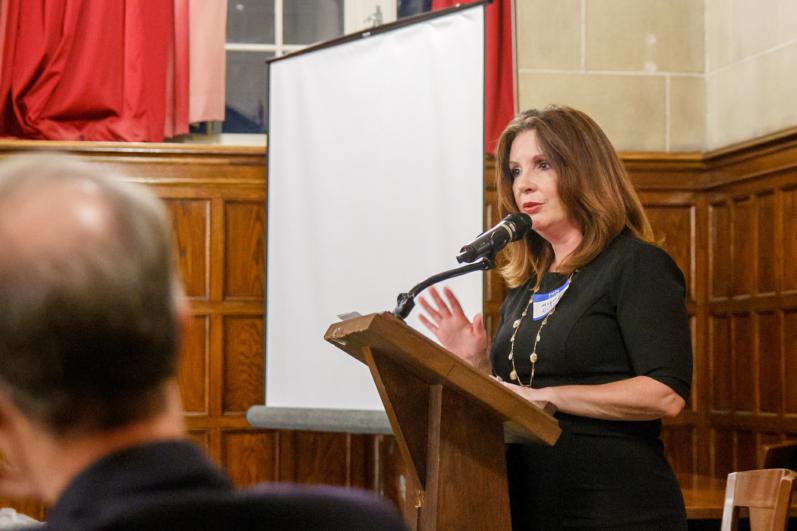Physicians guild's White Mass speaker highlights CRS relief efforts
BRIGHTON -- The war in Ukraine and other global catastrophes came into focus at the dinner speaking program following the Guild of St. Luke's annual White Mass, which took place at St. John's Seminary on Oct. 15.
The White Mass is held each year around the feast day of St. Luke, the patron of physicians, to honor healthcare providers and pray for God's assistance in their work. The dinner is also an opportunity for Catholic medical professionals to network and discuss significant moral and ethical issues.
The Mass took place in the seminary chapel, with Cardinal Seán P. O'Malley as the principal celebrant. Afterwards, the dinner and speaking program were held in the refectory.
The guest speaker was Megan Gilbert, the regional communications officer for Catholic Relief Services in Europe, the Middle East, and Central Asia. Gilbert spoke at length about the war in Ukraine, the food crisis that many countries are experiencing, and the work of Catholic Relief Services (CRS) on the ground.
"Because the mission of CRS is to promote the dignity of others, our work often centers around supporting people, working with them, to build that safe, comfortable place where they can live, work, raise their family, and thrive," Gilbert said.
She described CRS' "integral human development," a holistic approach based in Catholic social teaching.
"What it means is we engage people at every level," she said.
She spoke about her organization's partnership with Caritas, the local Catholic charity of individual countries. Many of her colleagues in Ukraine are displaced and have family members fighting in the war. But they continue to do their work to help others.
"They are truly remarkable. They keep going in the most challenging of situations, because they know people need them," Gilbert said.
CRS helps people by arranging shelter and providing counseling, medical vouchers, first aid and hygiene kits, and either food or cash to empower people to buy food for themselves.
One of their most important services, Gilbert said, is mental health, or psychosocial support. She explained that in traumatic situations, people usually turn to friends and neighbors, who step up to help them. But in war, those social networks are lost as people flee or suffer the same trauma, creating feelings of isolation.
"It's got to be scary and stressful. So, we want to help people through that kind of situation," Gilbert said.
"We try to help people build up those social networks," she added.
CRS does this through programs like summer camps for children and parenting groups for adults, creating structure and a sense of normalcy as well as interpersonal support.
Gilbert noted that winters in Ukraine can be brutal. To help people with housing, they work with landlords, find suitable housing, and make light repairs to buildings.
CRS also works in countries further from the international spotlight, such as those impacted by the global food crisis. These include Afghanistan, Yemen, Somalia, and other countries in eastern Africa and Central America. Current factors contributing to famine, Gilbert said, are conflict, climate change, COVID-19, and high costs.
In these cases, CRS helps by not only addressing the short-term needs, such as distributing food and clean water, but also planning long-term solutions. They hold trainings on how to manage farms during drought conditions, establish mobile health units, conduct nutrition screenings and refer severe cases of malnutrition for better healthcare.
"The one thing I have never heard anyone at CRS say is, 'I think we're just going to have to give up.' So we won't do that. Without a doubt, we keep going," Gilbert said.
Cardinal O'Malley spoke briefly after Gilbert's remarks, thanking her for her report. He recalled that when the archdiocese took a special collection in support of Ukraine, they raised over $1 million, which he said "shows how people (are) truly concerned and anxious to be a part of the solution."
Dr. Lucy Bayer-Zwirello, a maternal and fetal health specialist, spoke with The Pilot after the dinner. She said Gilbert "explained very well" both the problems and what CRS is doing to address them.
Bayer-Zwirello compared the work that CRS does on a global level to the work that healthcare providers do on a local level. She herself has a social worker at her office to help address patients' needs beyond their medical care.
"What we do is very important, whether we're a psychiatrist or an obstetrician or pediatrician or a pathologist, all of it is really for the betterment of society and of individuals," she said.
Information about the Guild of St. Luke is available at www.guildofstluke.org.



















